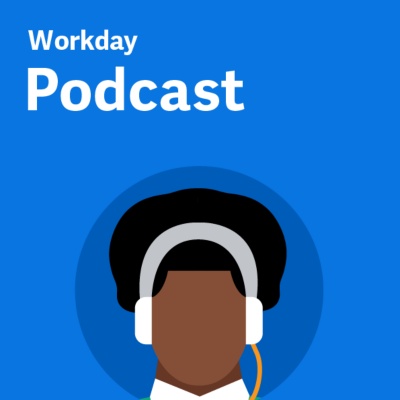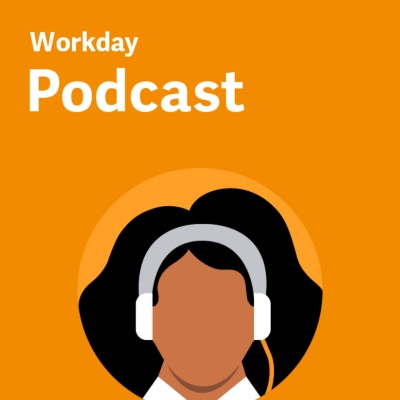Finding and engaging talent at one of the world’s leading music companies might sound like a walk in the park, but what happens when that talent is the supporting workforce rather than its recording artists? I caught up with Rhiannon Lawler, HRIS director for Warner Music Group, to talk about not only finding and engaging talent, but also building a culture that empowers employees to thrive in the workplace.
 Listen on SoundCloud: Workday Podcast: Find, Engage, Retain: Building a Culture of Harmony at Warner Music Group
Listen on SoundCloud: Workday Podcast: Find, Engage, Retain: Building a Culture of Harmony at Warner Music Group
 Listen on Apple Podcasts: Workday Podcast: Find, Engage, Retain: Building a Culture of Harmony at Warner Music Group
Listen on Apple Podcasts: Workday Podcast: Find, Engage, Retain: Building a Culture of Harmony at Warner Music Group
If you’re more of a reader, below you’ll find the transcript of our conversation, edited for clarity. You can find our other Workday Podcasts here.
Steve Dunne: Think Ed Sheeran, Michael Bublé, and Coldplay, and you have a pretty strong definition of musical talent. Finding those artists, keeping them happy and engaged is no mean feat, but for Warner Music Group, talent management is a concept that extends way beyond the glitz and glamour of its many artists. It also includes employees. I’m Steve Dunne from Workday. Today on the Workday Podcast, we’ll learn more about how one of the world’s largest entertainment and record label conglomerates finds, engages, and retains its employees at a time when the battle for talent makes it really tough.
We’re joined by Rhiannon Lawler, HRIS director for Warner Music Group. Welcome, Rhiannon.
Rhiannon Lawler: Hi.
Dunne: Can you tell us a little bit about your role and some of the challenges that you face in HR every day?
Lawler: Sure, thank you. As you mentioned, I’m the HRIS director, so my responsibility is to manage the Workday tool globally at Warner Music. We are in about 40 territories, 4,500 employees, give or take. We’ve been live on Workday, just coming up to 3 years. My current role is to make sure we’re utilizing Workday to the best of its ability, taking advantage of all the great features that you guys are pushing out to us, and trying to stay on that treadmill with keeping up. I’m making sure that we’re also looking at other Workday tools that might be useful in driving us forward.
Dunne: Warner Music Group is an enormous organization. In terms of the challenges of managing people in those different regions, what does that look like on a daily basis?
Lawler: We were quite fortunate, really. Prior to Workday, we didn’t have any sort of HR systems or common processes, so deploying Workday was one of the big drivers for people transformation for us. We wanted to take that opportunity to drive out global consistency. One of our key principles that we try to adhere to is “global and consistent.” We’ve developed processes that we’re adopting in all 40 of our countries, so that keeps it simple for us. Some of the challenges are that some of the people don’t necessarily want that consistency. A lot of people want to do it their own way.
And we have to look at the reasons for that. Obviously, if there are legal reasons locally we’ll try to customize the process for them, but it’s more about providing that education for people about why we’re sticking to our guns on that. That makes it a good decision for us because it means that we can keep on deploying things if we are doing it in a global and consistent way.
I think one of the other challenges in my role in particular because it’s a global role, is that we’re not always speaking to native-English speakers. We do get a lot of people contacting us where maybe English isn’t their first language, which is great because you obviously get to learn a lot.
Dunne: You talked a little bit about agility— you work in an industry that I imagine can change quite rapidly. How do you meet that from a technology and a cultural perspective as well in terms of managing change and staying agile?
Lawler: That’s definitely one of the biggest things from a people point of view that we’re looking at, so I don’t think we’re there by any stretch of the imagination on our journey. We’re probably still at the start, to be honest with you. We are looking at the generations that are coming into the workforce and what they expect from technology in the workplace and best practices, and even things like flexible working and what the working environment looks like to them. That’s definitely one of the big strategic directions we’re going in.
There’s more that we can be doing. I don’t think we’re where we want to be, and I think there’s probably a lot of organizations that would say the same because we’re all competing against each other for that same key talent.
Dunne: I’d imagine the battle for talent is one that Warner Music faces every day at an artist level, but how does the organization find the right people for the rest of its workforce given how competitive that landscape is?
Lawler: We’re probably doing the same as everybody else. We primarily use our internal recruitment team to do that because we think they know our culture best. We don’t tend to work with agencies an awful lot because, as I said, we know our culture, and we know the kind of people we’re looking for. We’ve tried to explore other avenues, especially in the U.S. We do a lot around college interns and trying to get people interested in the industry and getting hold of them early in their careers to create that loyalty with them. We’re also doing things like looking at the gig economy. That’s something very new for us, but it’s a direction that we know a lot of the industries are moving in, especially in some of the creative industries where it’s people doing small snippets of work for you and then going off and maybe working somewhere else and coming back again.
It’s definitely something, even from a legal point of view, where we need more agility because at the moment, we’ve got competition and a competitive advantage that we want to make sure that we keep hold of. But, we want to keep hold of being able to be responsive to resource demands, and I think the gig economy is definitely pushing us out of our comfort zone on that one.
Dunne: How do you think about employee engagement of what I imagine—and you can correct me if I’m wrong—is a fairly young workforce?
Lawler: There are a few oldies in there like myself, but yeah, we’re definitely quite a young workforce. We are looking at what that generation expects when they come to us. We’ve done quite a lot of research, especially in the UK around what that market expects when coming to work, and things like working hours, flexibility, and the technology that they expect—the day-to-day experience. We’re also looking a lot at what they expect from learning, and we know people want that on-demand and quick learning—being able to just tap in on the go when they want to pick up new skills and things. That’s something that we’re also exploring.
We’re trying to make sure that our employees feel valued, so we’re doing a lot around what that proposition looks like for our workforce. It’s something that I think is going to materialize quite a lot within the next 12 months.
Dunne: You talked a little bit about consumer-style technologies that the younger workforce expects—the Facebook in the workplace, that kind of thing. How do you go about building those experiences and meeting those demands?
Lawler: I think at the moment Workday is our primary tool for that. A lot of the rest of our IT landscape has been quite traditional so at Warner, Workday is our first and only cloud technology at the moment, but it’s something that we’re looking to expand on. I was on the team that deployed Workday at Warner, and we are forever speaking to other areas of the business about how we did it and what the support is like. I think we’re definitely investing in that area.
I think day to day, it’s more about the worker experience of what it’s actually like to physically sit in office—if that’s where you happen to be at Warner—and making sure that feels like a great place to work while we let the technology catch up with us.
Dunne: I’ve read about the work that Warner Music Group is doing to transform its global HR processes. I think getting access to fast, accurate data was one of the big objectives in that. Can you talk a little bit about that, how important that was, and how you went through that process?
Lawler: We’re definitely only starting to understand the data that we’ve got. I think when we deployed Workday we massively underestimated how big that was going to be, even though we knew that it was one of the things that we wanted to gain out of the deployment. We’re using it to look at things like who our talent is in the organization. We’ve just done a big piece, especially around the gender pay gap in the UK, so we did some analysis around that. We’ve also been doing some diversity initiatives in the UK to understand what the background of our workforce is and look at how that impacts trends with things like people who’ve been promoted and who’s exiting the organization and how that might impact or drive us to diversity.
But beyond that we’re also looking at it from a candidate point of view as well, so that’s one of the big things—trying to understand the backgrounds of the people that we’re having come in and if it is attracting the right type of talent. To your earlier point, if we’re forever just going out and working with agencies, or we’re only getting those types of workers in, do we want to try and go to the colleges or different parts of London, for example, to get different types of talent and to get different skills and personality types into the organization?
It’s allowing us to understand what we’re doing and whether we want to be continuously doing it; whether we want to change it up, plus the standard things that you would expect with looking back at compensation changes and trends around that. We’re also starting to look at things like high potential and retention, and how that links into retention or departure stats within the organization.
Dunne: There’s a lot of talk about artificial intelligence and machine learning within HR. Are you seeing much of that emerging technology coming through in what you do? Or how do you see it fitting into HR moving forward into the future?
Lawler: It’s not something we’re seeing at the moment, but for me personally it’s one of the things I’m interested most in exploring. I’m seeing some of the things that are possible—it still blows my mind. I think we all thought that in the year 2000 we’d be in flying cars, so I’m hoping that AI and the chat bots isn’t another equivalent of the flying car syndrome because I think a lot of people are starting to see it. But for us, we haven’t started deploying it. I would love to start using it for Workday; for example, being able to get that instant chat help for “How do I book time off?” or “What’s my time-off balance?” or putting in a request through Workday, because I think people are working more in that way so rather than having to go into a system and key a process, it’s having that conversation or chat with a system where it then goes off and does it for you.
I think people are expecting that a lot more. I’d love to get us to that point—I’m not sure how far off we are from it. And then we’ve also been looking in the wider HR space at similar types of things. If you’re saying to me, “I want to find a policy for paternity leave,” again, it would be having something with AI and chat bots doing some of that help for you, rather than you having to go off and find things on internet or shared drives and getting into the weeds that way.
Dunne: Yeah, the real self-service stuff. Absolutely. A question more around the business value of HR, because HR’s becoming increasingly important at a strategic C-level if you like: How important do you think HR is in driving a company’s strategic objectives, and what role do you see that function having in the future as we move forward?
Lawler: We’re lucky at Warner because it’s definitely been recognized that without our people we wouldn’t have the success that we do. Our CHRO has a great seat at the board, and she definitely drives forward the people strategy and has a lot of respect from her peers. They’re willing to invest in that, so I think that’s really important. I think the big organizations that are successful have that ethos—that your success comes down to your people and whether they’re invested in the organization, and they want to come to work, and they’re passionate.
I hope those are the footsteps that we’re looking to follow. As I say, I’m sure we’ve got some work to do, but we’re in the right direction, I think.
Dunne: Any kind of initiatives that you’re working on as a business from an HR perspective that you want to talk about at all?
Lawler: I think we’ve touched on quite a lot of them already. We’ve got the employee proposition that we’re looking at currently, but I can’t share too many of the details on that one. I think from a technology point of view, it’s about looking at the on-demand learning piece. At the moment our learning is very much an instructor-led classroom, facilitated sessions, with great facilitators and great content, but we know that it’s not always feasible to take three hours out of someone’s day—there is that desire for people to just be able to click and learn for five minutes on a long journey into the office, rather than taking half a day out.
Dunne: Well listen, that’s all we’ve got time for today. I want to thank Rhiannon Lawler from Warner Music Group for joining us today at the Workday Podcast. If you’d like to hear more, please subscribe. I’m Steve Dunne, and thank you for listening.
Lawler: Thank you.


 Listen on Apple Podcasts:
Listen on Apple Podcasts: 

